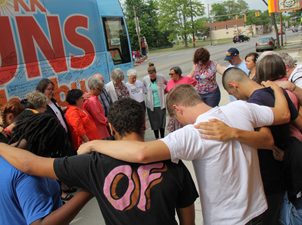
Understanding That We Are All Connected
By Sister Nancy Sylvester, IHM
From NETWORK’s Catholic Social Justice Reflection Guide
One of the principles of Catholic Social Justice Teaching is needed more than ever today. It is that of the Common Good. We, as a nation, have lost our sense of responsibility as citizens to address the needs of the whole community and seem to only advocate for those policies which affect me and my group. As we move further and further away from each other and self-identify with specific groups, it becomes harder to address what we need as a people, as a nation, to realize our full potential as children of God.
When I was at NETWORK, I heard Congresspersons talk about the common good. Today, it is rare if anyone raises it up. Yet, for me it is growing in importance as we navigate an increasingly complex political terrain that has become mean spirited and divisively partisan. We have forgotten that governments play an important role in our lives. Catholic Social Justice Teaching reminds us of this when in the encyclical Pacem in Terris, Pope John the XXIII wrote that “the attainment of the common good is the sole reason for the existence of civil authorities.” Every society needs a body who will promote the good of each of us and has the authority and capacity to step back and address the good of the whole.
In Catholic Social Justice Teaching, to promote the common good is to create the conditions for every person to realize their full potential as children of God. To do that is to safeguard and foster the various rights first stated in Pacem in Terris. These rights include: life, the right to bodily integrity and the means necessary for its proper development – food, clothing, shelter, medical care, rest and social services; freedom to worship; to work; to form associations; to immigrate and emigrate; and to take an active role in public life.
This understanding of the common good, safeguarding what we need to flourish as full human beings, reflects the scriptural image that we are all parts of one body and each is needed for the whole to function and be healthy. We are the Body of Christ and we find our fulfillment in relationship with each other.
Our society is far from embracing such a teaching, yet I believe it is critical for our future. It is understanding that we are all connected and all share the same Earth-home that will enable us to relinquish group agendas for the common good so that we can move forward together as a nation.
My work for justice and systemic change has evolved over these past years to address the transformation of consciousness. I believe that contemplation—individually and communally—is transformative. Becoming more attuned to God working within you frees you to see your biases, your assumptions, your world view. You awaken to the fears you have of those who are not like yourself; you begin to stop reacting to people and ideas and begin to respond.
It is with this self-awareness rooted in our deep center where the Divine dwells that will free us to create a space to meet those with whom we differ. We need to talk to each other and to those whom we elect about the values and vision we have as a people, a nation, a planetary community. We need to come to understand that we are all sisters and brothers; we are all connected, sentient and non-sentient beings. If we grasp that and respect each other, then the possibility exists that over time we can imagine a new way forward where the common good is addressed in mutually enhancing ways.
Nancy Sylvester, IHM, is founder and director of the Institute for Communal Contemplation and Dialogue (ICCD) since 2002. She served in leadership of her own religious community, the Sister Servants of the Immaculate Heart of Mary, Monroe, MI. www.ihmsisters.org as well as in the Presidency of the Leadership Conference of Women Religious. Prior to that she was National Coordinator of NETWORK, the National Catholic Social Justice Lobby. A new free resource that is related to this topic can be found at www.iccdinstitute.org click on “Finding Our Balance Post Election.”







